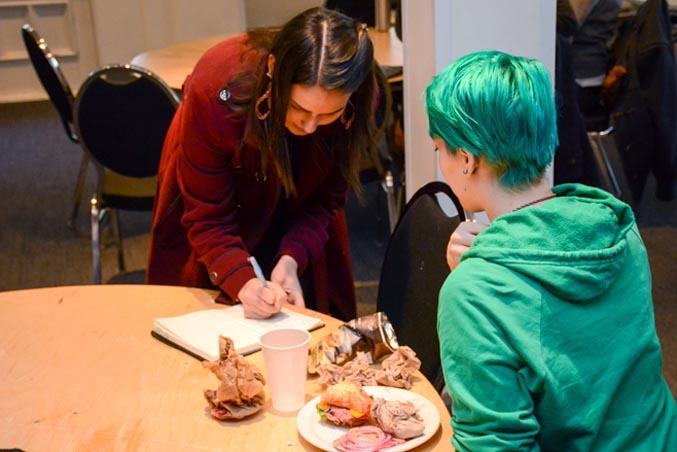By Brontë Campbell
Jan. 19 to Jan 23. is Queer Histories Week at Ryerson, and the Lunch and Learn on Jan 20. was just one of six events taking place this week, hosted by RyePRIDE and the Equity Service Centre.
Drew Silverthorn, a Good Food Centre coordinator was one of two presenters at the lunch and learn, which heavily focused on LGBT youth homelessness and the lack of food security in North America.
Food security is when all people have equal access to healthy, safe, reliable food and is based more on the quality of the food, rather than the quantity.
This also includes respecting an individual’s dietary preferences, cultural and political views, and their economic status as defined by the WHO during the World Food Summit in 1996.
“It’s important to look at not only food security abroad but also within Toronto and how it affects different people within Canada,” said Stephanie Rodriguez Bathgate, first year English student at Ryerson University.
“There is an assumption that queer people, especially men, have high disposable incomes,” said Silverthorn, who talked about how many gay men hold jobs in places more traditionally held by woman, though their pay is generally higher than their female counterparts.
A financial gap can become a problem, as a lesbian couple sometimes will make less than two gay men, according to Sidney Dryman, a RyePRIDE assistant and second year English student, who was the second presenter at the lunch and learn.
“It was interesting to look at the way access to food can impact the economic standing of LGBTQ individuals, and the statistics are shocking to think about in terms of the greater heterosexual population,” said Rodriguez Bathgate.
In Canada, a lot of food insecurity is a result of not just low income but also homelessness.
20 per cent of the homeless population in Canada are young people between the ages of 16 and 24. Of those, 25 per cent to 40 per cent of homeless youth have identified as LGBTQ. Furthermore, some young people can have difficulty getting financial aid from available organizations like OSAP, which often requires parental financial records.
Many young-people in the LGBT community are rejected by their parents upon coming out. As a result many have difficulty receiving financial aid and can find themselves on the street.
Prostitution for food, or even money for food can be another result of homelessness and food insecurity, as 11 per cent of men and 23 per cent of women have been reported doing so.
“Allocating funds towards not only bettering the lives of LGBTQ youth, but also helping to make healthy food accessible to homeless youth and people in minority groups,” may cause a change,” said Bathgate.












Leave a Reply